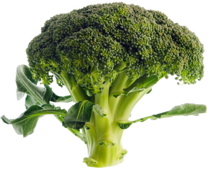Broccoli

Broccoli is one of the cruciferous vegetables, which are known for their powerful cancer-fighting properties. Kale, Brussels sprouts, and cauliflower are also in this family.
Broccoli by itself has been the subject of many health studies and its impressive cancer-fighting properties, particularly with bladder, lung, ovarian, breast, prostate, and colorectal cancers, are well documented.
Sprouted broccoli seeds are rapidly growing in popularity due to their high concentration of cancer-fighting phytonutrients. In general, sprouts offer a higher concentration of vitamins and minerals than their full-grown vegetable counterparts.
| Serving size: | 1 cup chopped |
| Region: | Great Britain, Italy, North America |
Health Benefits
| Colon | Substantially lowers risk of colorectal cancer when eaten at least 3-5 times per week. Eat only organic, raw or lightly steamed broccoli for cancer-fighting effects. |
| Eyes/Vision | Helps prevent cataracts. |
| Heart | Significantly reduces risk of heart disease, even compared with other vegetables. |
| Lungs | Substantially lowers risk of lung cancer when eaten at least 3-5 times per week. Eat only organic, raw or lightly steamed broccoli for cancer-fighting effects. |
| Prostate | Weekly consumption of broccoli dramatically reduces risk of advanced-stage prostate cancer. When eaten in combination with tomatoes, broccoli is even more effective at fighting prostate cancer. Eat only organic, raw or lightly steamed broccoli for cancer-fighting effects. |
| Skin | Helps to repair sun-damaged skin. |
| Stomach | Broccoli and broccoli sprouts are effective against H. pylori, the bacteria that causes ulcers. Broccoli sprouts may also help prevent gastric cancer. |
Nutrients
| Calcium | 42.8 mg | 4% | |
| Chlorophyll | N/A | N/A | Make sure to eat raw or very lightly steamed. |
| Sulfur | N/A | N/A | |
| Vitamin B9/Folate | 57.3 mcg | 29% | |
| Vitamin C | 81.2 mg | 135% | |
| Vitamin K | 92.5 mcg | 116% | |
| Zinc | 0.4 mg | 3% |
